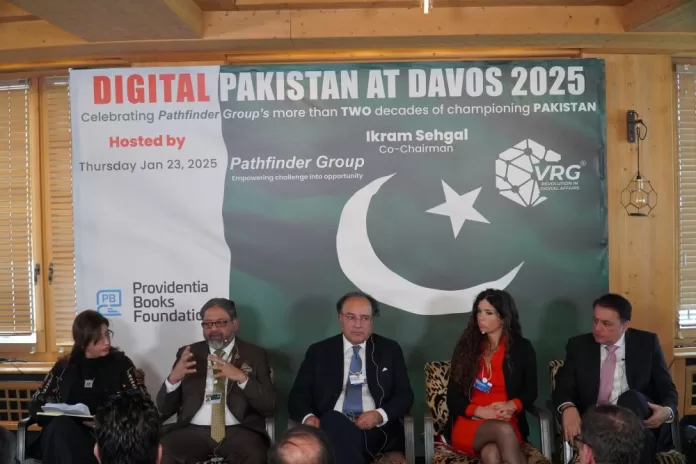
Pathfinder Group hosted the Digital Pakistan Lunch on 23rd January 2025, at the Pakistan Pavilion during the World Economic Forum (WEF) Annual Meeting in Davos. Dr Huma Baqai, Senior Vice Chairperson of KCFR and Rector of Millennium Institute of Technology & Entrepreneurship (MiTE) moderated the session.
Dr Huma Baqai Sr. Vice Chairperson, KCFR
I am doing the final session, which is Digital Pakistan Lunch. So, I’m quite excited about it. The reason is that, as you all know, the theme of the World Economic Forum this year is “Collaboration for the Intelligent Age.” We all know there is no convincing needed on the point that if you do not ride the technology tide, you may get behind or may be left behind.
For countries like Pakistan, it is even more of a challenge. It’s a developing country with various constraints and compulsions. We’ve talked about them extensively in the three or four sessions we had, and some very candid, open conversations took place. The challenges were identified. I’m glad we are ending the activities of the Pakistan Pavilion with Digital Pakistan Lunch. Why do I say that? I say that because Pakistan, despite its problems, is riding what I call the technology tide. Why do I say that? I say that because internet penetration stands at 45.7%, but, more interestingly, cellular mobile connections are almost 80%. We just want to bridge this gap by using cellular mobile connections to address the lack of infrastructure that countries like Pakistan suffer from.
We have fantastic examples from Africa, where it is being done. At the same time, in the conversations we’ve had, I’d like to address the digital divide. My face-to-face with the digital divide happened when COVID hit us and we shut down the classrooms. I was associated with one of the best institutions in Pakistan. At that time, I was teaching there. We were an institution that went online within 48 hours. We did that, but then we also realized that although we catered to a comparatively privileged class, the digital divide existed. We had to devise ways to make it accessible to our 3,000 students but Pakistan is much bigger than that.
Today, as I speak to you, the man who sits next to me is someone who’s bridged that gap and has done miracles with something called Asaan Mobile Account (AMA). We are happy to have Senator Muhammad Aurangzeb, thank you so muchfor joining us for this very important pertinent session. We are very excited about it and more so now, that you are here but I’m going to first request Muhammad Salman Ali, CEO of VRG who works largely on financial inclusion. Let’s find out what this man has done and what it means in terms of numbers, financial inclusivity, women empowerment, upward social mobility, and empowering people on the ground. This is an initiative that has grown big. Of course, there was resistance, but at the end of the day, I understand now that the State Bank is rock solid behind us. The government, if it doesn’t fully support it, at least acknowledges it. So, Salman, over to you.
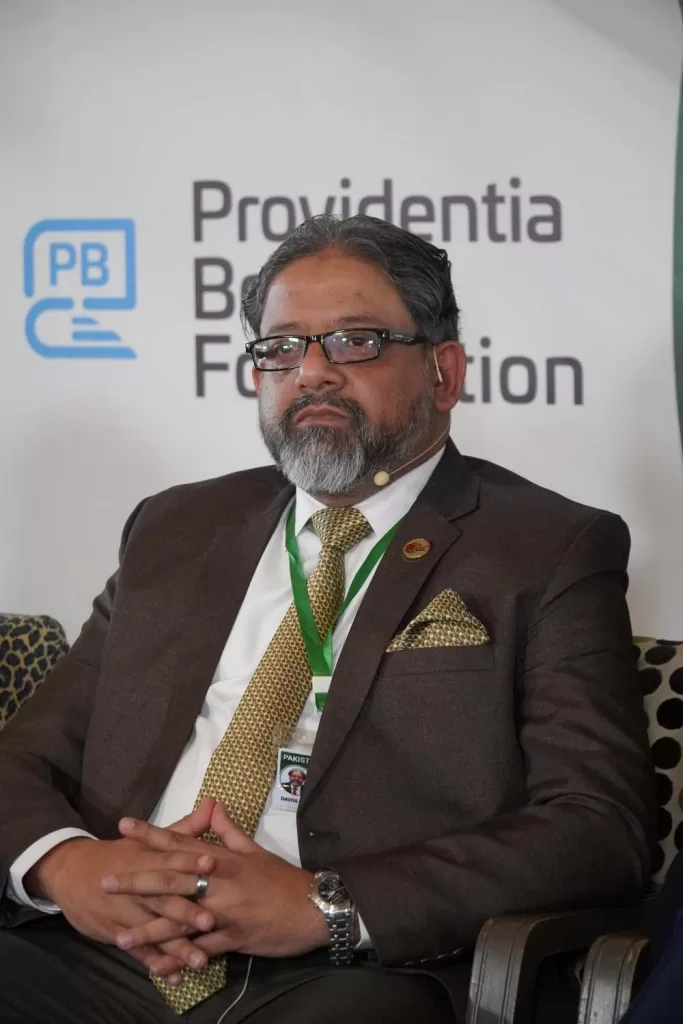
Salman Ali CEO, Virtual Remittance Gateway (VRG)
Pakistan is a progressing country right now, especially in the last three to four years. If you focus on the progress, particularly on financial inclusion and the digital financial side, the growth in the digital sector in Pakistan is amazing. You can see the numbers—the numbers of digital payments are getting higher, rising from 40% to 82%. Why is this happening? Because there is some infrastructure already in place or some scheme or facility available for the people of Pakistan who have, over the last four to five years, not been properly included. Why is that? Just because of one fact: they were not given the right technological solution. In Pakistan, we still have 194.6 million subscribers, but only 48% are smartphone users. The rest are still feature phone users. So, what about those people who are financially excluded because of the services they are not accessing? They don’t have bank branches nearby, so you need to create a solution for this. The right solution for the right people.
The Asaan Mobile Account (AMA) scheme was created and developed by Pakistanis within Pakistan. It’s a scheme that works on a man-to-man model. Any SIM of any telecom operator can open a bank account in any bank with a simple shortcode – no app, no internet, just a simple shortcode. Just dial it on your cell phone. You can still see the numbers roaming in Pakistan. Dial *2262#, and you get the menu, select the bank, put in your CNIC, and that’s it. Within two minutes, all KYC and AML processes are done seamlessly while sitting at home, and you have your bank account. We have been doing this for the last 26 months, and the results are amazing. Right now, we are standing at 12.2 million new accounts in Pakistan using this technology. This has been recognized, and I’m thankful to the World Economic Forum, which has not only helped us in scaling this solution by sharing their knowledge and support. At this point in, this solution is a part of the Center for the Fourth Industrial Revolution for reducing the gender gap. This recognition from the World Economic Forum for this solution, and Pakistan especially, is significant.
Let me tell you something very special about it: out of these 12.2 million accounts, 36% are women’s accounts, which has never been done in Pakistan. Believe me, this is a huge milestone. And the good part about it is that we have the stats available. My stats show that even a lady sitting in FATA is using this service and performing physical transactions in a month. Most of the time, they are using it for bill payments and fund transfers. We have all the stats available, and we are sharing them with the State Bank of Pakistan and all the other regulatory authorities.
This is one part, but as per the National Financial Inclusion Strategy 2024–2028, this needs to be scaled up to 70 million accounts because we still have a gap. I’m just going to cover that later in the speech because the factor is we need to enable the environment. We need to create an ecosystem. That is the second part I’m trying to address here. In Pakistan, we’ve done one part: the account is there. You can put money into the account and start transactions. But what if a person is still not able to open a bank account and wants to do some sort of cash transaction—cash-in or cash-out— while living in a remote area with no bank account, no bank available, and a lack of infrastructure? What will you do? You will find one person over there, and that is the agent—a bank agent of a branchless banking agent.
Unfortunately, Pakistan has had branchless banking for the last 10 or 12 years and progressing very fast, but we still have a one-to-one solution. If I’m a customer of Bank A, I can only go to an agent of Bank A. There are 375,000 agents available, but in that area if the agent of that specific bank is not available, what should I do? There’s no interoperability.
Let me announce this. On January 16, 2025, before coming to WEF, we were awarded and mandated by the State Bank to start agent interoperability. We’re going to conduct our demo by the end of February.
Let me tell you that 90 million transactions happen in a month on the Agent Network, and still, we are a cash-based society. Why? Because these sorts of services are not available. If people get these services available, they can go to an agent and open a bank account just by putting their thumb in. These services are available right now, and we are progressing on these matters. I am thankful to the regulators who are now perceiving this issue very seriously.
Now, what’s the way forward? Taking these two components, think about it. You can use this platform for disaster relief services, for programs like the Benazir Income Support Program (BISP), one of the largest unconditional cash transfer poverty reduction programs. Up till now, nearly $1 billion has been disbursed to women under this program.
Now we need to improve the process. These women don’t need to stand in queues or go to camps and bank branches to receive their money. Why? They don’t need to? They just need to enrol them by dialing a code, opening a bank account, and directly getting their money into their accounts. If they need cash, they can go to an agent for a cash-out. Otherwise, they will have a digital account accessible using a $10 feature phone, without internet or a mobile app.
The second part is also very exciting. We need to move toward a concept called “war on cash,” which the honourable minister is also focusing on. Small steps can make a big impact. Like, you can directly make bill payments, and automate it, through digital channels only. As per State Bank statistics, one billion bill payments happen annually in Pakistan, with an average ticket size of PKR 4,500. However, this only covers 55% of bill payments, while 45% are still cashbased. Why? If we can have proper mandates, and no additional regulations required, we can achieve transparency and have a fully digital environment.
There’s still a lot to be done. Lastly, I must tell you a very important factor. Pakistan is an agriculture-based economy. As per the National Financial Inclusion Strategy 2024–2028, there is a heavy focus on agriculture to give digital solutions to farmers. This will help onboard farmers and offer them more financial services.
Now, here’s the surprise. The Agriculture Development Bank of Pakistan is commonly known as Zarai Taraqiati Bank Limited (ZTBL). So, we have signed an agreement with them to provide digital financial services using the same technology. This will not only provide financial services such as account opening, balance inquiries, and fund transfers but also enable loan services because farmers run on loans. And by using this system, they will be able to get loans within four hours. This is the biggest thing. But the next thing is very exciting. Why do farmers need a loan? It’s because middlemen who there, give them loans at very high rates and, in in return, buy their crops at very low prices to sell in the market. Farmers don’t get their fair share. As of yesterday night, we went live with ZTBL and have enabled half a million farmers on our platform to use financial services. Senator Aurangzeb during his tenure at HBL initiated HBL Zarai and created a unique marketplace concept. He is a pioneer and now, we are working with ZTBL, a government entity, to advance this vision.
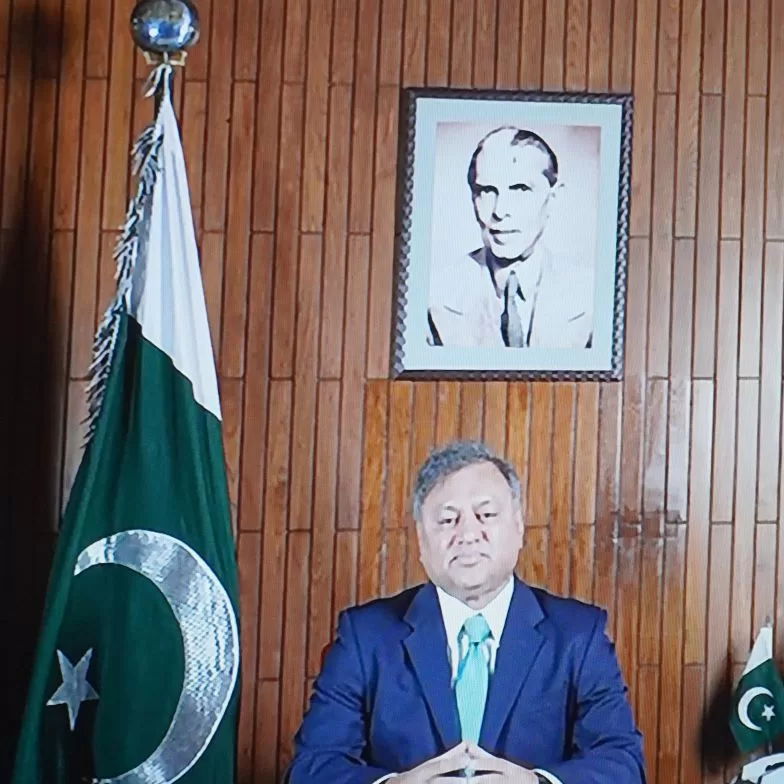
Tahir Yaqoob Bhatti President and CEO of ZTBL
First of all, thank you, VRG, for providing us with this opportunity to introduce ZTBL at the World Economic Forum in the Digital Pakistan segment. ZTBL is the oldest and largest agriculture bank in Pakistan. Our history goes back to 1952 when we were previously known as the Agriculture Development Bank of Pakistan. In 2002, we were renamed ZTBL and began operating as a specialized agriculture bank, as well as a scheduled bank with the Central Bank i.e., the State Bank of Pakistan. We have a network of over 500 branches, conveniently located across 482 cities and towns, covering every nook and corner of the country. We are dedicated to empowering the farming community by providing financial services, agriculture credit, and advisory solutions. We mainly focus on enhancing rural prosperity and sustainable growth.
Our recent initiative to digitize agriculture financing and provide viable banking solutions to farmers includes mobile banking and digital payment systems. We are dealing with over half a million farmers as our customers. Out of which 60% of whom do not use Android or smartphones. Hence, Unstructured Supplementary Service Data (USSD) solutions are critically important for them. The hallmark of our collaboration with VRG is to bring financial inclusion and synergy to rural communities through innovative solutions like USSD. This collaboration promises to be a game-changer, especially for small farmers. At ZTBL, we emphasize empowering subsistence-level farmers who own less than 12.5 acres of land by providing them access to digital tools, crop advisory services, and credit facilities to enhance agricultural productivity and livelihoods.
ZTBL’s partnership with VRG highlights our alignment with the vision of a sustainable and tech-driven economy, contributing to Pakistan’s broader goals for a Digital Pakistan. By offering AgriTech services like weather and crop information, livestock management, and agricultural inputs, we intend to position ZTBL as a key player in the digital revolution for economic inclusion and contributing to creating a digitally empowered and globally competitive Pakistan. Thank you very much.
Dr Huma Baqai, Moderator
We all feel privileged to have Kelly with us today. Kelly is the Head of Digital Inclusion and a Member of the Executive Committee for the World Economic Forum Kelly, what is your view of the initiatives that have just been identified, and how do you see them contributing to the whole concept of inclusion in Pakistan?

Kelly Ommundsen, Head of Digital Inclusion WEF – EDISON ALLIANCE
First of all, a big thank you for having me here today. We are honoured to have you as part of the Edison Alliance and a great partner since the alliance was launched. I think this is incredibly important, and I am happy to share a little more about the story and the vision. This is so essential because we need to meet people where they are. For those of you who have attended different sessions this week, you’ve probably heard a lot about AI and different frontier technologies.
These are very exciting and very important, but at the same time, we also need to understand, that we need people to have access wherever they are, with the tools that they have, with the financial means that they have. Finding innovative ways to use USSD technologies, particularly with ways in which we can partner with others. Agriculture is the key sector for us to empower them directly. When you have access to weather data and market prices, your ability is more economically competitive. We are excited about this initiative. One of the additional ways we are going to be focusing on the next section of the Edison Alliance is to add agriculture as an additional sector, so for us, this is music to our ears. We are delighted and a big congratulations to you!
Dr Huma Baqai:
Thank you. I have one more question for you. As I come from the education sector I wonder if all of this is music to your ears. I understand how crucial these efforts are for women’s empowerment, inclusivity, and upward social mobility. However, Pakistan also struggles with learning poverty, and it is in some ways linked to accessibility. Do you think we can take it there? Is there a possibility? Because I know the initiative in Rwanda and South Africa which has worked tremendously to address learning poverty.
Kelly Ommundsen:
Absolutely. Many of the intersectionality that causes the digital divide also reinforce these different issues. Education has been a core pillar of focus at the World Economic Forum. There are several ways to address this challenge. First, do you have access to a device? So oftentimes, you might have one device in the home, and that may not always go to the student or the woman, or someone with other structural disadvantages. Are there ways in which we can explore different community models? Not necessarily having a computer in every home or every school, but finding different ways to share those resources because we know it’s critically important to meet students where they are and to have the right kinds of tools.
What we have right now coming out is exciting in terms of tailoring different programs for students and enabling those who may not necessarily speak the dominant languages to access translated materials. Of course, we know that when you have access to education, you also gain access to greater digital literacy, and all of these become positive reinforcing cycles. We need to think about this holistically, as a way in which we are offering opportunities and education. This is the path to continue that positive cycle of economic empowerment.
Dr Huma Baqai:
So, when you try to address issues of the digital divide in a developing country, where does all of this come into play?
Kelly Ommundsen:
I think we need to take a systematic view. It’s not just about focusing on digital. It focuses on the economy, the gender imperative, the education imperative, and financial and digital literacy. All these things need to be addressed because if you look at any one challenge alone, you won’t be able to solve the greater issue at heart. With the Edison Alliance, we’ve taken a matrix approach in terms of how we’re thinking about the digital divide. The first piece is access. You need to have a cell phone tower, a subsea cable, or some way to have that connectivity. Pakistan has made great strides over the last 15 years, covering nearly 85% of the population. One issue that still needs to be addressed is access to fibre optics, as penetration rates remain quite low. Now, of course, with mobile telephones, you can use different solutions like those that were just shared to provide basic options. But as we’re thinking about how we’re preparing for what’s coming today also we want to be on the path for AI. We also need to think about the kinds of connectivity speeds we’ll need to unlock and enable those partnerships. The second one is affordability. Can you afford your device, and can you afford your data plan? This is critical for ensuring continuous access. And the third piece is usability. Do you have the skills? Is there relevant content in your language? So how do we look at where we can tackle each one of these individually? If we want to close the divide, we need to think about this holistically within the broader context.
Dr Huma Baqai, Moderator
I’m going to invite Abu Bakar to become a part of the conversation. He’s the Chief Executive Officer, Pakistan Software Export Board. I find that title very interesting, Software Export Board, what are we talking about here? What are we exporting?
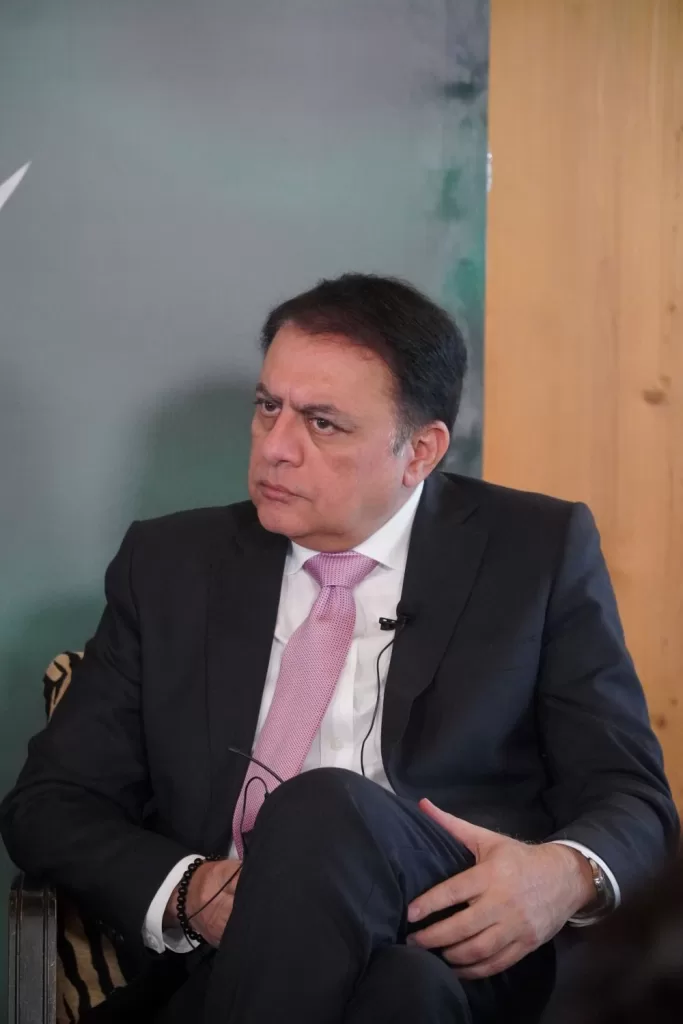
Abu Bakar CEO, Pakistan Software Export Board
This is part of the Ministry of IT, and our mandate is to increase software exports. Pakistan has about 25,000 IT companies, many of which develop innovative products and services – something people often overlook. According to a report by the Asian Development Bank, we have approximately 2.3 million freelancers who actively earn through their work, contributing significantly to foreign remittances that flow back into the country.
This is the essence of our software exports. Our mandate is straightforward: to enable a conducive environment, build supply, generate demand, and simplify business operations for everyone involved to expand our efforts. Remarkably, Pakistan ranks third globally in freelancing, outperforming India in some IT-related areas – something we should take pride in.
Dr Huma Baqai:
So, when you say you want to enable freelancers, what exactly are we doing on the ground? The reason I am asking you this question is there is discontent about how the freelancers in Pakistan are not supported the way they should have been supported. Internet interruptions are mentioned as an issue but despite that, we are number three in the world and the pie is growing bigger.
Abu Bakar:
Yes, it’s expanding rapidly. Let me start by sharing some numbers to give you context. Last year, in the fiscal year ending 2024, Pakistan’s official IT export figures reached $3.2 billion, reflecting a 24% increase. This year, in just the first six months, we’ve seen another 28% growth, and we’re on track to surpass $4.2 billion. Our ambitions for the future are even greater. One of the key factors enabling this growth is Pakistan’s export-friendly policies. People may not realize it, but Pakistan is among the most favourable regimes for exports, especially IT exports. There’s no tax on export earnings or remittances, which creates a highly attractive environment for businesses.
While some may focus on challenges when viewed from an international perspective – and having spent 30 years abroad and worked in many countries – I can confidently say that Pakistan offers one of the best environments in terms of export taxation policies. So, what are we doing to enable freelancers? Our focus is primarily on building the supply side. Last year, we trained a significant number of people through various initiatives. While the target was to train 3 million, we exceeded that by training 4.5 million individuals – a remarkable achievement. This training is focused on coding and digital skills programs specifically designed for freelancers. These efforts are part of the federal government’s initiatives, but every province contributes as well. Organizations like PSEB, Ignite, NAVTTC, and others are all actively involved in training freelancers. Beyond the government’s contributions, the private sector is also playing a major role. Private organizations like Saylani, JDC, and others are training individuals across Pakistan, complementing the government’s efforts in this area.

Dr Huma Baqai:
I know these trainings are happening all over the country and they’re very well received, especially in urban centres and they’re done by NGOs who do it as an initiative, also to get some political traction because these NGOs have political wings as well. My question to you is that to compete internationally, are these short trainings sufficient or do we need to be more focused on the kind of IT training we are providing to our youth?
Abu Bakar:
That’s a very good question, and I’ll approach it from a different angle. There’s a need and demand for all levels of training. Right now, we’re operating in a relatively low-value chain, providing services like freelancing. While being ranked third in the world for freelancing is commendable, that shouldn’t be our ultimate goal. We should aim for the higher end of the value chain. To address this, we’re not just focusing on basic freelancer training but also highend training.
For instance, we’ve recently announced – and will officially launch soon – a program to enter the semiconductor training space. This aligns with demand coming primarily from the Gulf region, where they’re looking for semiconductor designers. Additionally, we’re developing plans for advanced AI training and web development training to equip our workforce with cutting-edge skills. We are moving into the high-value chain, but I don’t think we’ll ever completely move away from the low-value chain. The challenge, as I always say, is two-dimensional – and I’ve observed this even in just 90 days. First, we need to increase our exports and establish ‘Brand Pakistan’ as more than just a low-value chain. Second, we face the issue of millions of unemployed youth, for whom lower-end skills provide essential opportunities.
To address both challenges, we are pursuing a balanced, multi-pronged strategy. This approach allows us to advance into high-value sectors while continuing to support initiatives that equip our youth with foundational skills.
Dr Huma Baqai:
How do you view the balance between regulation and restriction? In Pakistan, we often tend to confuse regulation with restriction. What is your perspective on this? You’ve spent significant time abroad and encountered similar issues in those societies. In a politically polarized country like Pakistan, how do you view the balance? How does this relate to privilege regarding regulation, restriction, and access?
Abu Bakar:
I think this is one of the most heated topics right now. From our side, at least, our goal is to make things as open and accessible as possible. However, there must be some guidelines in place because we are moving into a very different era – an information age that is inherently open and accessible. Every country is grappling with the challenge of determining how to regulate and secure this openness for their benefit. Pakistan has its own unique set of challenges in this regard, and we are also struggling to address them. I’m not going to claim that we’ve solved this problem, nor should we pretend that we have.
Dr Huma Baqai, Moderator
I request our chief guest, Senator Mohammad Aurangzeb, Federal Minister of Finance and Revenue for his comments.
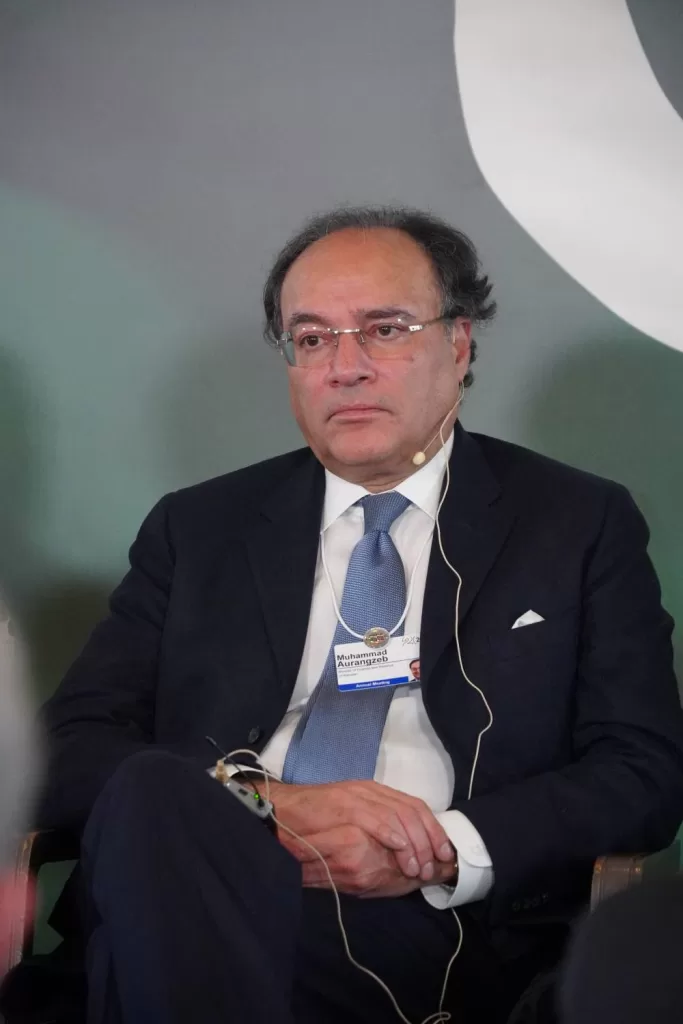
Senator Muhammad Aurangzeb Finance Minister of Pakistan
We have seen several centres of excellence emerge in Pakistan. For example, the Asaan Mobile Account has become a remarkable success story. Similarly, the Raast payment gateway is a fantastic step forward in terms of financial inclusion. If you look at NADRA, the comprehensive lifestyle data linked to CNICs isn’t too different from the Aadhaar Card system in India. The BISP program is another great example of how the focus has shifted from traditional brick-and-mortar approaches to digital solutions. Moreover, when we talk about women, many of them still use feature phones, yet a significant number are now transitioning to digital wallets.
This digital revolution in Pakistan, quite frankly, has little to do with formal education. Even with feature phones, if you guide users on how to manage them, they can adopt digital wallets seamlessly. It’s a great way forward for inclusion and progress. I just want to emphasize that whatever we are doing with our tax authority, particularly in terms of end-to-end digitalization of processes, must be seen in the right context. I always say that digitalization is not an end in itself – it’s a means to an end. It’s about enhancing transparency and improving client experience. Ultimately, it should unlock the immense digital economic value available to Pakistan.
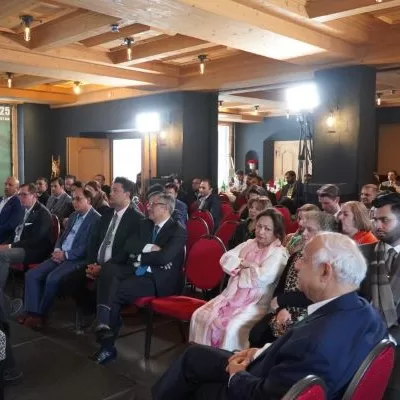
This week, we had an excellent discussion with the Digital Cooperation Organization (DCO) at WEF. We are deeply honoured that Pakistan is the first country to implement the Digital FDI initiative, with everyone involved contributing to a very comprehensive plan for moving forward. If we truly want to position Pakistan as a digital nation, we cannot operate in silos or focus only on verticals. While verticals have their centres of excellence, the real value lies in taking a horizontal approach. Only by going horizontal, we can unlock the potential within.
For this, we need a well-rounded, end-to-end plan that transcends departmental targets. Forget about the specific goals set by the State Bank or the Ministry of Finance. Focus instead on driving the country forward and building on the value you’ve already created. The priority should be progress and value addition – not just meeting predefined targets. The private sector must take the lead in driving the country forward. The government’s role is to provide a consistent policy framework and ensure policy continuity. Within the context of initiatives like the Digital FDI program with the DCO, this means focusing on digital infrastructure, digital adoption, additional digital services, and, importantly, digital exports.
An essential enabler in this process is the operation of Special Technology Zones, which are no different in concept from Special Economic Zones (SEZs). People often tell me that new SEZs are not being established, and I respond by saying: let’s first make the existing ones operational. For example, Bangladesh has 93 operational SEZs.
In Pakistan, we should focus on activating and optimizing the zones we already have before asking for more. The essence of SEZs and Special Technology Zones is the “plug-andplay” model. It’s the government’s responsibility to provide the necessary support and infrastructure – such as gas, electricity, and other utilities – to make this model work. Only then can these zones become the growth engines they are meant to be.
There’s a tremendous opportunity for AI data centres to be established in Pakistan. We have surplus energy, and with more people going off-grid, we should leverage that energy to set up AI data centres across the country. Any transformation begins with people, followed by processes, and then technology. The focus, as you and everyone else see it, should be on reskilling and upskilling the workforce. We are fortunate to have the third-largest freelance population in the world, which is a significant advantage and an enabling factor as we move forward.
Of course, it’s also about the capital being made available, whether on the startup side or elsewhere, where investors are willing to believe in you – like with SadaPay, NayaPay, and other positive developments happening in the space. However, what we need to do is move beyond working in isolated verticals and bring everything together. This is what will propel Pakistan forward as a digital nation, whether it’s through e-governance or other related initiatives.
My perspective remains that we have a huge opportunity. From December to May, we reached $384 million in IT services-related exports, which is the highest ever in our history, and we’re only going up from here. This is no different from the remittance discussion. Every time we hit a new milestone, we often think we’ve reached the peak, but we haven’t. Last year, our remittance flows totaled $30.2 billion. If this trajectory continues, Insha’Allah, we will reach $35 billion this fiscal year. Now, think about the kind of external and fiscal space we are creating, the structure we’re building, and the efficiency we’re putting in place. The real economic value that will be unlocked through this hasn’t been fully considered. This includes financial inclusion, among other things – all of which are use cases. When we talk about verticals, these are essentially use cases. The challenge is how we bring all these use cases together. For example, when we look at the FBR, we realize that we’re not fully connected, and that’s where the loopholes arise.
There’s no shortage of data. NADRA, through my CNIC, has access to all my data – how many vehicles I own, how many houses I have and where, my utility bills, my travel history, and all my lifestyle data. There’s no question about it; they have all my lifestyle information. Additionally, we have data available through the tax authority, which shows how much tax I’m paying. What we were doing previously was taking this data in its raw form and sending it to field formations. So, what do the field formations do with it? Some might discard it, while others might try to extract value for the exchequer, but mostly, they would try to extract value from me. This is the power we are now working to harness in this use case.
First, these databases need to be connected, and based on that, we can move into data analytics. This data analytics and its dashboard will drive the entire process. It will allow us to sit down – myself, the Chairman of FBR, and other relevant people – and assess what the RTO and LTO are doing, what each region is accomplishing, what each tax officer is doing, and maintain an entire audit trail of what was sent at each point in time, and so on. We’re working on this in a very effective way with centres of excellence. Our biggest challenge is how to consolidate all of this data in one place. To me, that’s the key to making 1+1 equal 3 or 2+2 equal 5. This is the only way we will unlock the economic value that will, Insha’Allah, come from a Digital Pakistan.
Dr Huma Baqai, Moderator
Thank you so much for that very candid input. I’ll now request Mr Ikram Sehgal, for the vote of thanks.

Ikram Sehgal Co-Chairman Pathfinder Group
Thank you, Senator. That was a very clear and concise discussion, and we’ve effectively communicated the message. I’d just like to add a few points. You mentioned Raast. For two years, the State Bank overlooked us, but they have now realized the importance of reaching people who have only feature phones. So, we’re now integrating with Raast. The second point is the Asaan Mobile Account (AMA) App. For about a year, they kept pushing us, and we kept advising them not to launch it in Urdu but in Roman Urdu. As you mentioned, anyone who can use the TikTok app may not understand how it works, but they know how to use it. Similarly, anyone who knows how to use TikTok can easily use the AMA App for all its intended purposes. It is now available in Roman Urdu and is already being tested at banks. This is part of the broader thinking process behind these initiatives.
As for your ‘War on Cash’ – the concept you introduced – it can be enacted with just a stroke of a pen. Simply require everyone to pay their telephone bills through bank accounts or AMA accounts. It doesn’t matter how it’s done – just ensure they pay. Once you make payments digitally, you eliminate cash, and you bring everything into one unified system. That system becomes forensic – the very data you want to consolidate and analyze. So now, the ball is in your court.
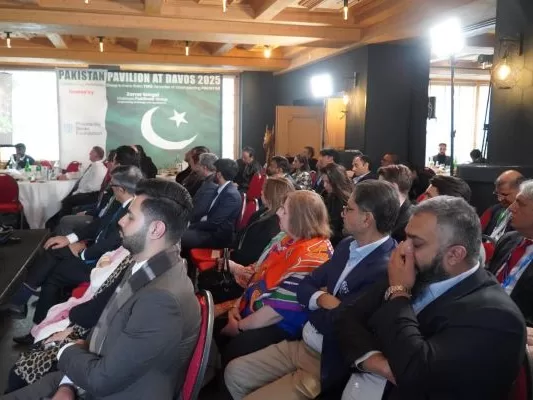
Abu Bakar:
It would be good for the audience to know, and I believe Mr Aurangzeb has already mentioned, that under the WEF, the Digital Cooperation Organization was formed three years ago with 16 member countries. As he mentioned, the first inaugural annual event was publicly announced two days ago by the World Economic Forum. It will be held in Islamabad on April 29th and 30th. This is a significant event for Pakistan, as it will elevate our status on the global stage by hosting it. We are branding this as the “Davos of Digital Pakistan,” with Islamabad being the new hub for digital innovation. The entire world will be watching. The primary goal of the DCO is to bridge the digital divide, and Pakistan is leading the charge.
People should be aware of this, especially in this digital age. Legally, we have now nearly passed the Digital Nation Act. This means that Pakistan officially has a Digital Commission Authority and a mandate to create a digital economy. This is the first time such a development has occurred in Pakistan, and there is a great deal of hope for what lies ahead.
Senator Aurangzeb:
Finally, I will say this: like everything else in Pakistan, we have plans – lots of plans. But ultimately, it’s about execution and implementation. That’s the rigour we need as we move forward, InshAllah. Thank you.




